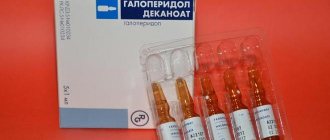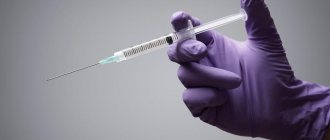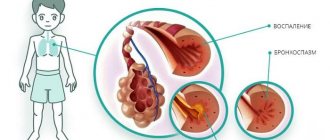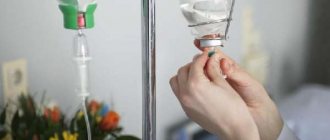Caffein-benzoate sodium solution for injections
Caffeine is a methylxanthine that has a psychostimulating and analeptic effect. Competitively blocks central and peripheral A1 and A2 adenosine receptors. Inhibits the activity of phosphodiesterase in the central nervous system, heart, smooth muscle organs, skeletal muscles, adipose tissue, promotes the accumulation of cAMP and cGMP in them (this effect is observed when using only high doses of caffeine). Stimulates the centers of the medulla oblongata (respiratory and vasomotor), as well as the n.vagus center, has a direct stimulating effect on the cerebral cortex. In high doses, it facilitates interneuronal conduction in the spinal cord, enhancing spinal reflexes. Increases mental and physical performance, stimulates mental activity, motor activity, shortens reaction time, temporarily reduces fatigue and drowsiness. In small doses, the stimulating effect predominates, and in large doses, the effect of depression of the nervous system predominates. It quickens and deepens breathing, usually has a positive ino-, chrono-, batmo- and dromotropic effect (since the effect on the cardiovascular system consists of a direct stimulating effect on the myocardium and a simultaneous stimulating effect on the n.vagus centers, the resulting effect depends on the predominance of that or other action). Stimulates the vasomotor center and has a direct relaxing effect on the vascular wall, which leads to dilation of the vessels of the heart, skeletal muscles and kidneys, while the tone of the cerebral arteries increases (causes a narrowing of the blood vessels of the brain, which is accompanied by a decrease in cerebral blood flow and oxygen pressure in the brain). Blood pressure changes under the influence of vascular and cardiac mechanisms of caffeine's influence: with normal initial blood pressure, caffeine does not change or slightly increases it; with arterial hypotension, it normalizes it. It has an antispasmodic effect on smooth muscles (including a bronchodilator effect), and a stimulating effect on striated muscles. Increases gastric secretory activity and diuresis (decreased reabsorption of sodium and water cations in the proximal and distal renal tubules, as well as dilation of renal vessels and increased filtration in the renal glomeruli). Reduces platelet aggregation and histamine release from mast cells. Increases basal metabolism: increases glycogenolysis, increases lipolysis.
Metabolism
Once in the body, caffeine is metabolized into dimethylxanthine derivatives (paraxanthine, theobromine, theophylline), then into monoxanthine, and then into the xanthine molecule. Other metabolic products are di- and trimethyl allantoin, uric acid and uracil derivatives.
Caffeine is easily distributed in plasma, intercellular fluid and inside cells. It also circulates in extracellular adipose tissue. By the way, people who smoke metabolize caffeine faster. Also, differences in the speed of the process may occur among people of different nationalities, which is explained by a genetic factor. But there is practically no difference in the rate of absorption between women and men.
Our body is able to absorb these “energizing molecules” quite quickly. But it also quickly gets rid of them. Caffeine is metabolized primarily by the liver and has a relatively short half-life. Usually 5-7 hours are enough to get rid of half of the resulting substance. For this reason, the cup of coffee you enjoyed before lunch will definitely not prevent you from falling asleep in the evening.
Caffeine can be synthetic or natural (obtained from plants). It is possible to determine the difference between them only in the laboratory. The concentration of any of these substances in the body can be measured by examining saliva, since this substance accumulates primarily in liquids in the body. Caffeine can enter the body through the mucous membranes of the cheeks. Chewing gum containing the substance is characterized by faster absorption compared to drinking coffee, since in the form of a drink, caffeine must first pass through the stomach and intestines, and only then enters the blood.
What happens if you overdo it?
When taken orally, 15 mg of caffeine per kilogram of body weight is toxic, and 150 mg is fatal. That is, a person who weighs 68 kg will be poisoned by one gram of caffeine, and will die from 10 grams. Think about this before you drink 10 cans of energy drink on a bet.
Caffeine powder is a special song. It is used as a nerve stimulant and is promoted as a fitness and muscle-building aid, and some people voluntarily take it for this purpose. The US Food and Drug Administration warns that one teaspoon of pure caffeine powder is equivalent to 28 cups of coffee. It is much easier to overdose on powder than to overdose on energy drinks. Large amounts of caffeine increase the activity of the sympathetic nervous system, causing severe heart palpitations and convulsions.
Although poisoning from caffeine powder is rare, it does happen, and sometimes with fatal consequences. Both athletes who independently take this substance and specialists make mistakes. So at the University of Northumbria, scientists, conducting an experiment, accidentally gave two students 30 g of caffeine instead of 300 mg. Fortunately, the students survived, but they had to spend some time in the hospital.
If you are healthy, then you can safely drink drinks containing caffeine, guided, of course, by Figures 1 and 2, but it is better not to deal with powder.
Application for weight loss
Consuming caffeine wisely helps you lose weight. For the best effect, it is recommended to combine drinking coffee or an energy drink with fitness classes.
Weight loss occurs due to:
Correct doses of caffeine - for athletes and amateurs
A safe dose of caffeine depends on your health condition. Some people drink strong coffee all day long without any harmful consequences, while for others, just a single cup causes their blood pressure to rise, their sleep to be disturbed, headaches, and nerves. True, caffeine-induced nervousness can be mitigated by the amino acid L-theanine, which is found in green tea leaves. Interestingly, similar symptoms are observed in people with caffeine withdrawal. They also yawn, complain of fatigue, runny nose, muscle stiffness, and find it difficult to concentrate. Despite its positive properties, caffeine cannot be considered a completely safe product.
Authoritative organizations such as the European Food Safety Authority (EFSA), the US National Academies of Sciences (NAS) and Health Canada have concluded that healthy adults can safely consume up to 400 mg of caffeine per day . More than 400 mg can be taken on special occasions (for example, during emergency preparation for an exam). This dose will not cause side effects if such force majeure events occur rarely.
Here's an example of which drinks contain a safe daily dose of caffeine:
The effects of caffeination depend on the time of administration. Most people can drink 200 mg of caffeine in one sitting less than 2 hours before intense physical activity. However, even 100 mg can disrupt sleep if you drink coffee or energy drink at night.
Caffeine leaves the body rather slowly, the half-life is about 5 hours, so people who drank strong coffee less than 10 hours ago still have some amount of the alkaloid fermenting in their blood .
I. General information
1. Name of the medicinal product for veterinary use:
– trade name of the medicinal product – Caffeine-sodium benzoate 20%;
– international nonproprietary names – caffeine, sodium benzoate.
2. Dosage form: solution for injection.
1 ml of the drug contains as active ingredients: caffeine - 75 mg, sodium benzoate - 120 mg, and as excipients: sodium phosphate disubstituted 12-water, citric acid and water for injection.
3. In appearance, sodium caffeine benzoate 20% is a transparent, colorless liquid.
The shelf life of the medicinal product, subject to storage conditions in the manufacturer's closed packaging, is 3 years from the date of production, after opening the bottle - 28 days.
It is prohibited to use the medicinal product after the expiration date.
4. Sodium caffeine benzoate 20% is produced packaged in 10, 20 and 100 ml glass bottles of appropriate capacity, hermetically sealed with rubber stoppers and reinforced with aluminum caps with tamper evident clips. Each consumer package is supplied with instructions for use of the drug.
5. The medicinal product is stored in the manufacturer’s sealed packaging, separate from food and feed, in a place protected from direct sunlight at a temperature of 0°C to 25°C.
6. Sodium caffeine benzoate 20% should be kept out of the reach of children.
7. Unused medicinal product is disposed of in accordance with legal requirements.
8. Sodium caffeine benzoate 20% is available without a veterinarian's prescription.
How to safely quit caffeine
Try drinking plain water instead of cola first. Stick to this principle for a week. Have your caffeine cravings decreased? This means that the “treatment” must be continued. Now is the time to replace traditional coffee with a similar decaffeinated drink. It is also important to track portions of food consumption. Continue until your daily caffeine dose drops to 100 mg or less. Gradually giving up caffeine-containing drinks will protect you from unpleasant physiological sensations and will also be less “painful” on a psychological level.
Without caffeine, do you feel tired? Make sure you are getting enough rest per day? Better yet, check the vitamin and mineral balance in the body? Drowsiness and chronic fatigue may indicate vitamin deficiency or other health problems. But caffeine does not cure this.
Substance abuse
The effects of caffeine determine a person's psychological need for daily intake.
Chronic intoxication is the main reason for the formation of substance abuse. In severe cases, it resembles amphetamine addiction, but, fortunately, it occurs much more easily without life-threatening consequences. As the period of abuse increases, household stimulants no longer provide such a euphoric effect. Most addicts develop tolerance; daily doses of the substance can reach 500-1000 mg. For the development of substance abuse, the patient’s personality traits play an important role.
Stopping stimulants leads to withdrawal symptoms. During withdrawal (“withdrawal”), signs of nervous exhaustion come to the fore: unbearable fatigue, apathy, irritability. Often the mood decreases to the point of depression. Using the substance slightly alleviates the painful condition, which confirms the fact of addiction.
Harmful properties
Some studies suggest that caffeine may be harmful to your health. Here are some arguments in favor of this.
- Consuming more than 4 cups of coffee per day leads to early death. Research shows that this dose, taken daily, is enough to increase the risk of sudden death by 21%.
- Increases blood pressure. In people suffering from arterial hypertension, after 2 cups of coffee, blood pressure rises over the next 2-3 hours.
- Increases the risk of cardiac diseases at a young age. Drinking 4 cups of coffee daily is enough to quadruple your risk of heart attack.
- Caffeine can trigger the development of gout.
- Provokes the formation of cysts in the mammary glands in women. It is enough to consume 30 mg of coffee per day to increase the chances of fibrocystic mastopathy by one and a half times. And women who drink 500 mg of coffee are 2-3 times more at risk of cystitis.
- Causes urinary incontinence. People who consume the drink regularly and in large doses are 70% more likely to experience incontinence than others.
- Causes insomnia.
- Causes stomach upset. Especially if you drink coffee on an empty stomach.
- Excessive caffeine consumption provokes headaches.
- Caffeine leads to impaired fertility in women: the chances of getting pregnant are reduced by 27%.
- The risk of miscarriages increases: it is enough to drink 2 servings of coffee daily for several weeks before conception.
- It worsens the health of diabetics because it disrupts glucose metabolism.
- May cause overdose or allergy symptoms.
- Accelerates heart contraction.
- Exacerbates the symptoms of menopause.
- Increases anxiety and depression.
- Caffeine lovers consume more glucose, which is fraught with obesity and diabetes.
- It suppresses collagen production in the skin.
- Makes bone tissue more fragile, which increases the risk of fractures.
How much do you need to drink to reach your caffeine limit?
To answer this question, you need to know how much caffeine is in each cup/can/bottle you drink. This information is contained in Figure 1, but for those who find it difficult to concentrate without caffeine, as well as for adherents of a mono-diet (like starting the day with coffee from McDonald's, they won't take anything else caffeinated in their mouth) there is also Figure 2.
Rice. 2 How many and what drinks can you drink so as not to exceed the daily caffeine limit of 400 mg.











